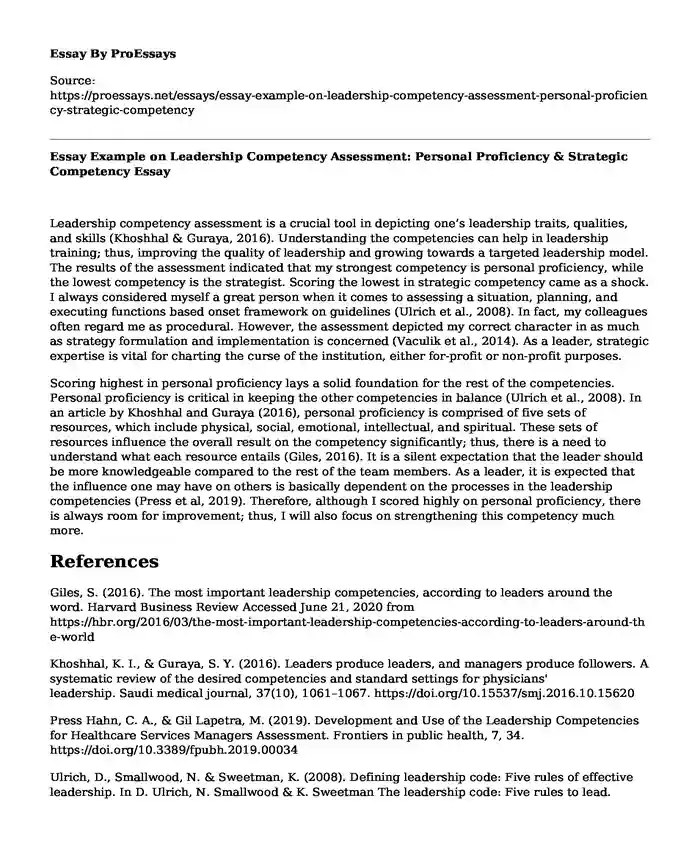Leadership competency assessment is a crucial tool in depicting one’s leadership traits, qualities, and skills (Khoshhal & Guraya, 2016). Understanding the competencies can help in leadership training; thus, improving the quality of leadership and growing towards a targeted leadership model. The results of the assessment indicated that my strongest competency is personal proficiency, while the lowest competency is the strategist. Scoring the lowest in strategic competency came as a shock. I always considered myself a great person when it comes to assessing a situation, planning, and executing functions based onset framework on guidelines (Ulrich et al., 2008). In fact, my colleagues often regard me as procedural. However, the assessment depicted my correct character in as much as strategy formulation and implementation is concerned (Vaculik et al., 2014). As a leader, strategic expertise is vital for charting the curse of the institution, either for-profit or non-profit purposes.
Scoring highest in personal proficiency lays a solid foundation for the rest of the competencies. Personal proficiency is critical in keeping the other competencies in balance (Ulrich et al., 2008). In an article by Khoshhal and Guraya (2016), personal proficiency is comprised of five sets of resources, which include physical, social, emotional, intellectual, and spiritual. These sets of resources influence the overall result on the competency significantly; thus, there is a need to understand what each resource entails (Giles, 2016). It is a silent expectation that the leader should be more knowledgeable compared to the rest of the team members. As a leader, it is expected that the influence one may have on others is basically dependent on the processes in the leadership competencies (Press et al, 2019). Therefore, although I scored highly on personal proficiency, there is always room for improvement; thus, I will also focus on strengthening this competency much more.
References
Giles, S. (2016). The most important leadership competencies, according to leaders around the word. Harvard Business Review Accessed June 21, 2020 from https://hbr.org/2016/03/the-most-important-leadership-competencies-according-to-leaders-around-the-world
Khoshhal, K. I., & Guraya, S. Y. (2016). Leaders produce leaders, and managers produce followers. A systematic review of the desired competencies and standard settings for physicians' leadership. Saudi medical journal, 37(10), 1061–1067. https://doi.org/10.15537/smj.2016.10.15620
Press Hahn, C. A., & Gil Lapetra, M. (2019). Development and Use of the Leadership Competencies for Healthcare Services Managers Assessment. Frontiers in public health, 7, 34. https://doi.org/10.3389/fpubh.2019.00034
Ulrich, D., Smallwood, N. & Sweetman, K. (2008). Defining leadership code: Five rules of effective leadership. In D. Ulrich, N. Smallwood & K. Sweetman The leadership code: Five rules to lead. Harvard Business
Vaculik, M., Prochazka, J. & Smutny, P. (2014). Competencies and leadership effectiveness: Which skills predict effective leadership. Conference: 10th European Conference on Management Leadership and Governance, At Zagreb. DOI: 10.13140/2.1.2931.9364
Cite this page
Essay Example on Leadership Competency Assessment: Personal Proficiency & Strategic Competency. (2023, Sep 10). Retrieved from https://proessays.net/essays/essay-example-on-leadership-competency-assessment-personal-proficiency-strategic-competency
If you are the original author of this essay and no longer wish to have it published on the ProEssays website, please click below to request its removal:
- Time Management Tips for Learners
- Case Study Example: Shell's Dependent Stakeholders
- Management Decision Problem for Increasing Share of the Athletic Shoe Market
- Personal Internet Use and Risk Management Essay Example
- Essay Sample on The Crux of Leadership: Making Wise Decisions in Difficult Situations
- Essay on Planning Company Party: Teamwork & Appraisal Review
- Paper Example on Reviving Professional Culture in Education







